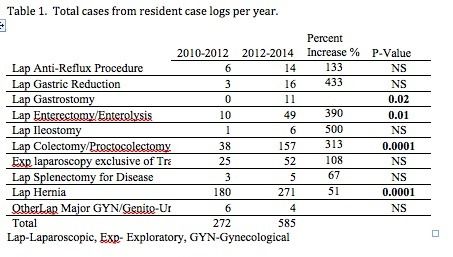|
Back to 2015 Annual Meeting Program
Effect of Minimally Invasive Surgery Fellowship on Residents' Case Log
Maria Altieri*, Heather Levites, Dana Telem, Caitlin a. Halbert, Richard Scriven, Deborah Thornton, Aurora D. Pryor
General Surgery, Stony Brook University Hospital, Stony Brook, NY
Introduction:
As laparoscopy becomes the standard of care in many areas of general surgery, there is an increased need for residents in surgery programs to acquire advanced laparoscopic skills. Since the introduction of minimally invasive surgery fellowships, there has been a continuing debate on whether fellowship training has an adverse effect on the general surgery residents' exposure to laparoscopic cases. The aim of our study was to examine whether fellowships adversely affect operative case logs for general surgery residents at an academic center.
Methods:
Following IRB approval, the Resident Case Log system from the Accreditation Council for Graduate Medical Education (ACGME) was queried to obtain all PGY 1-5 residents' operative case logs. The minimally invasive/advanced gastrointestinal fellowship at our institution was introduced in 2012, so we examined case logs 2 years before and 2 years following that date. Simple laparoscopic procedures, such as laparoscopic appendectomy and laparoscopic cholecystectomy, and pediatric procedures were excluded. P- values less than 0.05 were considered statistically significant.
Results: In 2010-2012 and 2012-2014 time periods, residents logged 272 and 585 complex laparoscopic cases, respectively. There were 43 residents during the 2010-2012 period and 43 and 44 residents in 2012-2014. When looking at the two time periods, a trend of increased numbers for all procedures was noted, except Laparoscopic GYN/Genito-Urinary procedures (Table 1). Average percent increase in complex general surgery procedures was 249+/- 179.8%. Four procedures, namely laparoscopic gastrostomy, laparoscopic enterectomy/enterolysis, laparoscopic colectomy/proctocolectomy, and laparoscopic inguinal/femoral hernia repair were significantly increased between the two time periods, with P-values of 0.02, 0.01, 0.0001, and 0.0001, respectively (Table 1).
Conclusion: A minimally invasive fellowship program has a favorable effect on resident's case log. It appears that residents can benefit from the presence of a fellowship at an academic center as they can participate in more complex laparoscopic cases.

Back to 2015 Annual Meeting Program
|


